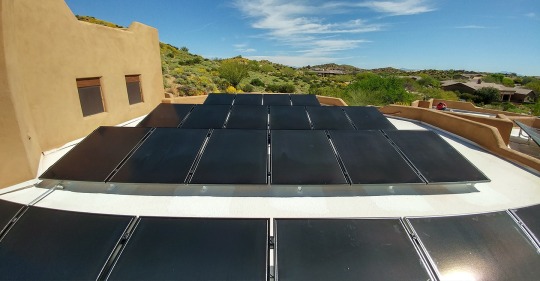#Solar for Business
Text
Power Your Life with Solar: Solutions for Homes and Businesses
Discover the benefits of going solar for home or business. Whether you're looking to reduce energy bills, boost sustainability, or increase your property value, our tailored solar solutions provide the perfect fit. Learn how you can harness the power of the sun to create a brighter, more efficient future for your household or commercial enterprise.
0 notes
Text
Zip Solar your trusted partner for commercial solar solutions in Australia. Explore our commercial solar packages & unlock energy independence. Get a FREE quote!
0 notes
Text
Solar Power for Businesses: How Businesses Can Benefit from Integrating Solar Energy Solutions

In today's rapidly evolving business landscape, sustainability and cost-efficiency are paramount considerations. Solar power offers businesses a transformative opportunity to reduce operational costs, enhance corporate social responsibility, and achieve energy independence. This article explores how businesses can leverage solar energy solutions, the benefits of solar power systems, installation considerations, and steps to integrate solar technology into commercial operations.
Benefits of Solar Power Systems for Businesses
Cost Savings: One of the primary advantages of solar energy for businesses is significant cost savings on electricity bills. By generating electricity onsite through solar panels, businesses reduce reliance on grid-supplied power, mitigating exposure to fluctuating energy prices and reducing operating expenses over the system's lifespan.
Return on Investment (ROI): Solar power systems offer a compelling ROI over time. Initial investments in solar panel installation can be offset by financial incentives such as tax credits, rebates, and accelerated depreciation. The long-term savings on electricity bills contribute to a favorable financial return, enhancing profitability and cash flow.
Energy Independence: Solar energy provides businesses with greater energy independence and resilience. By generating their own electricity, businesses can mitigate risks associated with grid outages and disruptions, ensuring continuous operations and maintaining critical infrastructure during emergencies.
Environmental Impact: Adopting solar power demonstrates a commitment to environmental stewardship and sustainability. Solar energy produces no greenhouse gas emissions during operation, reducing carbon footprints and contributing to corporate sustainability goals. Businesses can enhance their reputation as environmentally responsible entities, appealing to environmentally conscious consumers and investors.
Long-Term Stability: Solar power systems offer long-term stability in energy costs. Unlike fossil fuels subject to market volatility, solar energy provides predictable and stable electricity rates over the system's 25-30 year lifespan, providing budget certainty and strategic planning advantages.
Installation Considerations for Businesses
Before integrating solar energy solutions, businesses should consider the following factors:
Energy Demand: Evaluate current and future energy demand to determine the appropriate size and configuration of the solar system. Analyze peak electricity usage, seasonal variations, and potential growth to optimize system design and maximize energy savings.
Roof Suitability: Assess the suitability of rooftops or available land for solar panel installation. Consider factors such as roof orientation, shading from nearby structures, and structural integrity to ensure optimal sunlight exposure and system performance.
Regulatory Compliance: Familiarize yourself with local regulations, building codes, and permitting requirements for solar panel installation. Obtain necessary approvals and permits from municipal authorities and utility providers to ensure compliance and facilitate seamless integration.
Financial Incentives: Research available financial incentives and support mechanisms for solar adoption. Explore opportunities for tax incentives, grants, rebates, and favorable financing options to minimize upfront costs and accelerate ROI.
Steps to Integrate Solar Energy Solutions
Consultation and Assessment: Engage with reputable solar providers to conduct a comprehensive site assessment and energy audit. Evaluate solar potential, review installation options, and obtain customized proposals detailing system design, equipment specifications, and financial projections.
System Design and Engineering: Collaborate with solar engineers and designers to develop a tailored solar energy system aligned with business objectives and operational requirements. Evaluate technology options such as solar panels, inverters, mounting systems, and monitoring solutions to optimize performance and reliability.
Installation and Commissioning: Partner with experienced installers to execute solar panel installation according to approved designs and specifications. Ensure meticulous installation practices, including electrical wiring, mounting structures, and system integration to achieve seamless operation and compliance with safety standards.
Grid Connection and Compliance: Coordinate with utility providers to facilitate grid connection and metering arrangements. Obtain necessary approvals, permits, and inspections to authorize system operation and ensure compliance with regulatory requirements.
Monitoring and Maintenance: Implement robust monitoring and maintenance protocols to monitor system performance, identify potential issues, and optimize energy production. Conduct routine inspections, cleaning, and proactive maintenance to maximize system efficiency, longevity, and return on investment.
Conclusion
Solar power presents businesses with a compelling opportunity to achieve operational excellence, reduce costs, and enhance sustainability efforts. By integrating solar energy solutions, businesses can leverage renewable energy to mitigate financial risks, enhance environmental stewardship, and differentiate themselves in competitive markets. Understanding the benefits, installation considerations, and steps to adopt solar technology empowers businesses to embrace clean energy solutions and pave the way towards a sustainable future.
Embrace the power of solar energy—transform your business operations, optimize energy efficiency, and lead the way in sustainable business practices. Start your journey to solar today and reap the rewards of renewable energy integration.
0 notes
Text
PepSolar: Your Partner for Solar Solutions for Businesses
PepSolar offers comprehensive "Solar for Business" solutions, empowering companies to harness the sun's energy for sustainable and cost-effective power generation. Their expert team tailors solar systems to meet specific commercial needs, reducing energy costs and environmental impact. With a focus on efficiency, PepSolar's services make transitioning to solar power seamless for businesses, ensuring a brighter, eco-friendly future.
0 notes
Text
As businesses increasingly seek to reduce their environmental impact and cut costs, solar panels have emerged as a popular solution for generating clean, renewable energy.
0 notes
Link
Do you know high electricity usage in the commercial sector increases the high carbon footprint in the ecosystem? But you would be surprised that commercial solar power systems play a significant role in saving the environment. Then, check out this very informative blog on how commercial solar power systems help to protect the environment.
#CommercialSolarPowerSystems#CommercialSolarSystems#Commercial Solar Energy Systems#Solar Systems For Business#Solar for Business
0 notes
Text
Commercial Solar Panel Installers

Purchasing commercial solar panels can be a great way to save on your energy costs. But before you buy your solar panel, you need to make sure that you have found the right installers to help you with your solar installation.
YSG Solar
YSG Solar is one of the top commercial solar panel installers in Australia and the West Coast. They have been in business for over seven years and have helped a multitude of clients achieve their energy goals. They are also a family owned business.
They offer a 25-year warranty on their panels. They also have a free consultation. They are certified NABCEP installers. They have a team of experts in every aspect of the installation process. They also offer battery storage. They even offer a $500 American Express gift card referral program.
They also have a comprehensive energy management system that is embedded with each solar installation. This system allows customers to track their energy usage and produce power. It is also possible to monitor their installation from their smartphone.
They also have a 25-year workmanship warranty on their inverters. Their equipment is of the highest quality from manufacturers with over 35 years of experience.
YSG Solar also offers a referral program. They are currently hiring solar installers.
Yingli Solar Power
Yingli Solar is one of the largest and most famous manufacturers of photovoltaic (PV) panels in the world. Yingli has a global presence and has delivered over 30 million PV modules globally. Its headquarters are in Baoding, Hebei Province, China. Yingli has more than 18,000 employees, and has factories in China and several other countries. They are a vertically integrated company that manufactures polysilicon, PV cells, and other components.
Yingli has a wide array of products, and offers modules for utility-scale installations worldwide. It also provides high quality products and services to customers. The company's most recent models offer the highest efficiencies in the market.
Yingli has been producing solar panels for over two decades. It is headquartered in Baoding, China, and has subsidiaries in North America and Europe. Aside from manufacturing PV cells, Yingli designs lighting systems and mobile communication base stations. It has been recognized for its contributions to the development of the Chinese solar industry.
Yingli Energy Solutions
Yingli is a China-based photovoltaic panel manufacturer with over two decades of industry experience. Its main product is monocrystalline bifacial solar panels. These modules feature superior performance efficiency and high energy output. It also offers a 25-year product warranty.
Yingli is a brand of Yingli Green Energy Holding Company Limited. The company is a vertically integrated manufacturer of photovoltaic systems. Its headquarters are located in Baoding, Hebei Province, China. The company has more than 30 subsidiaries across the world.
Yingli Green Energy's product range includes high-performing multicrystalline PV modules and monocrystalline PV modules. Yingli has entered into a distribution agreement with Energy Matters, a leading solar supplier in Australia. The Yingli and Energy Matters partnership will raise the bar on the quality of the solar industry.
As a solar industry leader, Yingli has supplied over 15 gigawatts of solar panels worldwide. Yingli's panels have been proven to perform in diverse climates and offer high power density.
In addition to supplying PV modules, Yingli is a leader in the development of the power plant industry. The company has a strong presence in Australia and focuses on providing high-quality products and services to customers. Its factory in Baoding, China, has been the company's headquarters for over two decades. Its manufacturing process utilizes advanced equipment and technology.
Find a commercial solar panel installer in your area
Choosing a commercial solar panel installer in your area is a big decision. It's important to choose a professional who can meet your needs and ensure the installation is done correctly.
The best installers should have a solid reputation. Check customer reviews online to learn about their quality and credibility. You can also ask friends and family for recommendations.
You should also make sure the company is licensed. It's a good idea to look for an electrical contractor's license.
Another factor you should look for is experience in the industry. You'll want to select a company with at least five years of experience. A longer work history means that the installer is more likely to adhere to warranty requirements and do future maintenance.
You should also inquire about the contractor's insurance coverage. There's no point in pursuing a solar installation project without insurance. If the company doesn't have it, you'll have to go through a lengthy legal battle to recover your money.
#commercial solar panel installers#industrial solar system#solar for small business#solar for business#solar for industries
0 notes
Text
Cleantech has an enshittification problem

On July 14, I'm giving the closing keynote for the fifteenth HACKERS ON PLANET EARTH, in QUEENS, NY. Happy Bastille Day! On July 20, I'm appearing in CHICAGO at Exile in Bookville.

EVs won't save the planet. Ultimately, the material bill for billions of individual vehicles and the unavoidable geometry of more cars-more traffic-more roads-greater distances-more cars dictate that the future of our cities and planet requires public transit – lots of it.
But no matter how much public transit we install, there's always going to be some personal vehicles on the road, and not just bikes, ebikes and scooters. Between deliveries, accessibility, and stubbornly low-density regions, there's going to be a lot of cars, vans and trucks on the road for the foreseeable future, and these should be electric.
Beyond that irreducible minimum of personal vehicles, there's the fact that individuals can't install their own public transit system; in places that lack the political will or means to create working transit, EVs are a way for people to significantly reduce their personal emissions.
In policy circles, EV adoption is treated as a logistical and financial issue, so governments have focused on making EVs affordable and increasing the density of charging stations. As an EV owner, I can affirm that affordability and logistics were important concerns when we were shopping for a car.
But there's a third EV problem that is almost entirely off policy radar: enshittification.
An EV is a rolling computer in a fancy case with a squishy person inside of it. While this can sound scary, there are lots of cool implications for this. For example, your EV could download your local power company's tariff schedule and preferentially charge itself when the rates are lowest; they could also coordinate with the utility to reduce charging when loads are peaking. You can start them with your phone. Your repair technician can run extensive remote diagnostics on them and help you solve many problems from the road. New features can be delivered over the air.
That's just for starters, but there's so much more in the future. After all, the signal virtue of a digital computer is its flexibility. The only computer we know how to make is the Turing complete, universal, Von Neumann machine, which can run every valid program. If a feature is computationally tractable – from automated parallel parking to advanced collision prevention – it can run on a car.
The problem is that this digital flexibility presents a moral hazard to EV manufacturers. EVs are designed to make any kind of unauthorized, owner-selected modification into an IP rights violation ("IP" in this case is "any law that lets me control the conduct of my customers or competitors"):
https://locusmag.com/2020/09/cory-doctorow-ip/
EVs are also designed so that the manufacturer can unilaterally exert control over them or alter their operation. EVs – even more than conventional vehicles – are designed to be remotely killswitched in order to help manufacturers and dealers pressure people into paying their car notes on time:
https://pluralistic.net/2023/07/24/rent-to-pwn/#kitt-is-a-demon
Manufacturers can reach into your car and change how much of your battery you can access:
https://pluralistic.net/2023/07/28/edison-not-tesla/#demon-haunted-world
They can lock your car and have it send its location to a repo man, then greet him by blinking its lights, honking its horn, and pulling out of its parking space:
https://tiremeetsroad.com/2021/03/18/tesla-allegedly-remotely-unlocks-model-3-owners-car-uses-smart-summon-to-help-repo-agent/
And of course, they can detect when you've asked independent mechanic to service your car and then punish you by degrading its functionality:
https://www.repairerdrivennews.com/2024/06/26/two-of-eight-claims-in-tesla-anti-trust-lawsuit-will-move-forward/
This is "twiddling" – unilaterally and irreversibly altering the functionality of a product or service, secure in the knowledge that IP law will prevent anyone from twiddling back by restoring the gadget to a preferred configuration:
https://pluralistic.net/2023/02/19/twiddler/
The thing is, for an EV, twiddling is the best case scenario. As bad as it is for the company that made your EV to change how it works whenever they feel like picking your pocket, that's infinitely preferable to the manufacturer going bankrupt and bricking your car.
That's what just happened to owners of Fisker EVs, cars that cost $40-70k. Cars are long-term purchases. An EV should last 12-20 years, or even longer if you pay to swap the battery pack. Fisker was founded in 2016 and shipped its first Ocean SUV in 2023. The company is now bankrupt:
https://insideevs.com/news/723669/fisker-inc-bankruptcy-chapter-11-official/
Fisker called its vehicles "software-based cars" and they weren't kidding. Without continuous software updates and server access, those Fisker Ocean SUVs are turning into bricks. What's more, the company designed the car from the ground up to make any kind of independent service and support into a felony, by wrapping the whole thing in overlapping layers of IP. That means that no one can step in with a module that jailbreaks the Fisker and drops in an alternative firmware that will keep the fleet rolling.
This is the third EV risk – not just finance, not just charger infrastructure, but the possibility that any whizzy, cool new EV company will go bust and brick your $70k cleantech investment, irreversibly transforming your car into 5,500 lb worth of e-waste.
This confers a huge advantage onto the big automakers like VW, Kia, Ford, etc. Tesla gets a pass, too, because it achieved critical mass before people started to wise up to the risk of twiddling and bricking. If you're making a serious investment in a product you expect to use for 20 years, are you really gonna buy it from a two-year old startup with six months' capital in the bank?
The incumbency advantage here means that the big automakers won't have any reason to sink a lot of money into R&D, because they won't have to worry about hungry startups with cool new ideas eating their lunches. They can maintain the cozy cartel that has seen cars stagnate for decades, with the majority of "innovation" taking the form of shitty, extractive and ill-starred ideas like touchscreen controls and an accelerator pedal that you have to rent by the month:
https://www.theverge.com/2022/11/23/23474969/mercedes-car-subscription-faster-acceleration-feature-price
Put that way, it's clear that this isn't an EV problem, it's a cleantech problem. Cleantech has all the problems of EVs: it requires a large capital expenditure, it will be "smart," and it is expected to last for decades. That's rooftop solar, heat-pumps, smart thermostat sensor arrays, and home storage batteries.
And just as with EVs, policymakers have focused on infrastructure and affordability without paying any attention to the enshittification risks. Your rooftop solar will likely be controlled via a Solaredge box – a terrible technology that stops working if it can't reach the internet for a protracted period (that's right, your home solar stops working if the grid fails!).
I found this out the hard way during the covid lockdowns, when Solaredge terminated its 3G cellular contract and notified me that I would have to replace the modem in my system or it would stop working. This was at the height of the supply-chain crisis and there was a long waiting list for any replacement modems, with wifi cards (that used your home internet rather than a cellular connection) completely sold out for most of a year.
There are good reasons to connect rooftop solar arrays to the internet – it's not just so that Solaredge can enshittify my service. Solar arrays that coordinate with the grid can make it much easier and safer to manage a grid that was designed for centralized power production and is being retrofitted for distributed generation, one roof at a time.
But when the imperatives of extraction and efficiency go to war, extraction always wins. After all, the Solaredge system is already in place and solar installers are largely ignorant of, and indifferent to, the reasons that a homeowner might want to directly control and monitor their system via local controls that don't roundtrip through the cloud.
Somewhere in the hindbrain of any prospective solar purchaser is the experience with bricked and enshittified "smart" gadgets, and the knowledge that anything they buy from a cool startup with lots of great ideas for improving production, monitoring, and/or costs poses the risk of having your 20 year investment bricked after just a few years – and, thanks to the extractive imperative, no one will be able to step in and restore your ex-solar array to good working order.
I make the majority of my living from books, which means that my pay is very "lumpy" – I get large sums when I publish a book and very little in between. For many years, I've used these payments to make big purchases, rather than financing them over long periods where I can't predict my income. We've used my book payments to put in solar, then an induction stove, then a battery. We used one to buy out the lease on our EV. And just a month ago, we used the money from my upcoming Enshittification book to put in a heat pump (with enough left over to pay for a pair of long-overdue cataract surgeries, scheduled for the fall).
When we started shopping for heat pumps, it was clear that this was a very exciting sector. First of all, heat pumps are kind of magic, so efficient and effective it's almost surreal. But beyond the basic tech – which has been around since the late 1940s – there is a vast ferment of cool digital features coming from exciting and innovative startups.
By nature, I'm the kid of person who likes these digital features. I started out as a computer programmer, and while I haven't written production code since the previous millennium, I've been in and around the tech industry for my whole adult life. But when it came time to buy a heat-pump – an investment that I expected to last for 20 years or more – there was no way I was going to buy one of these cool new digitally enhanced pumps, no matter how much the reviewers loved them. Sure, they'd work well, but it's precisely because I'm so knowledgeable about high tech that I could see that they would fail very, very badly.
You may think EVs are bullshit, and they are – though there will always be room for some personal vehicles, and it's better for people in transit deserts to drive EVs than gas-guzzlers. You may think rooftop solar is a dead-end and be all-in on utility scale solar (I think we need both, especially given the grid-disrupting extreme climate events on our horizon). But there's still a wide range of cleantech – induction tops, heat pumps, smart thermostats – that are capital intensive, have a long duty cycle, and have good reasons to be digitized and networked.
Take home storage batteries: your utility can push its rate card to your battery every time they change their prices, and your battery can use that information to decide when to let your house tap into the grid, and when to switch over to powering your home with the solar you've stored up during the day. This is a very old and proven pattern in tech: the old Fidonet BBS network used a version of this, with each BBS timing its calls to other nodes to coincide with the cheapest long-distance rates, so that messages for distant systems could be passed on:
https://en.wikipedia.org/wiki/FidoNet
Cleantech is a very dynamic sector, even if its triumphs are largely unheralded. There's a quiet revolution underway in generation, storage and transmission of renewable power, and a complimentary revolution in power-consumption in vehicles and homes:
https://pluralistic.net/2024/06/12/s-curve/#anything-that-cant-go-on-forever-eventually-stops
But cleantech is too important to leave to the incumbents, who are addicted to enshittification and planned obsolescence. These giant, financialized firms lack the discipline and culture to make products that have the features – and cost savings – to make them appealing to the very wide range of buyers who must transition as soon as possible, for the sake of the very planet.
It's not enough for our policymakers to focus on financing and infrastructure barriers to cleantech adoption. We also need a policy-level response to enshittification.
Ideally, every cleantech device would be designed so that it was impossible to enshittify – which would also make it impossible to brick:
Based on free software (best), or with source code escrowed with a trustee who must release the code if the company enters administration (distant second-best);
All patents in a royalty-free patent-pool (best); or in a trust that will release them into a royalty-free pool if the company enters administration (distant second-best);
No parts-pairing or other DRM permitted (best); or with parts-pairing utilities available to all parties on a reasonable and non-discriminatory basis (distant second-best);
All diagnostic and error codes in the public domain, with all codes in the clear within the device (best); or with decoding utilities available on demand to all comers on a reasonable and non-discriminatory basis (distant second-best).
There's an obvious business objection to this: it will reduce investment in innovative cleantech because investors will perceive these restrictions as limits on the expected profits of their portfolio companies. It's true: these measures are designed to prevent rent-extraction and other enshittificatory practices by cleantech companies, and to the extent that investors are counting on enshittification rents, this might prevent them from investing.
But that has to be balanced against the way that a general prohibition on enshittificatory practices will inspire consumer confidence in innovative and novel cleantech products, because buyers will know that their investments will be protected over the whole expected lifespan of the product, even if the startup goes bust (nearly every startup goes bust). These measures mean that a company with a cool product will have a much larger customer-base to sell to. Those additional sales more than offset the loss of expected revenue from cheating and screwing your customers by twiddling them to death.
There's also an obvious legal objection to this: creating these policies will require a huge amount of action from Congress and the executive branch, a whole whack of new rules and laws to make them happen, and each will attract court-challenges.
That's also true, though it shouldn't stop us from trying to get legal reforms. As a matter of public policy, it's terrible and fucked up that companies can enshittify the things we buy and leave us with no remedy.
However, we don't have to wait for legal reform to make this work. We can take a shortcut with procurement – the things governments buy with public money. The feds, the states and localities buy a lot of cleantech: for public facilities, for public housing, for public use. Prudent public policy dictates that governments should refuse to buy any tech unless it is designed to be enshittification-resistant.
This is an old and honorable tradition in policymaking. Lincoln insisted that the rifles he bought for the Union Army come with interoperable tooling and ammo, for obvious reasons. No one wants to be the Commander in Chief who shows up on the battlefield and says, "Sorry, boys, war's postponed, our sole supplier decided to stop making ammunition."
By creating a market for enshittification-proof cleantech, governments can ensure that the public always has the option of buying an EV that can't be bricked even if the maker goes bust, a heat-pump whose digital features can be replaced or maintained by a third party of your choosing, a solar controller that coordinates with the grid in ways that serve their owners – not the manufacturers' shareholders.
We're going to have to change a lot to survive the coming years. Sure, there's a lot of scary ways that things can go wrong, but there's plenty about our world that should change, and plenty of ways those changes could be for the better. It's not enough for policymakers to focus on ensuring that we can afford to buy whatever badly thought-through, extractive tech the biggest companies want to foist on us – we also need a focus on making cleantech fit for purpose, truly smart, reliable and resilient.

Support me this summer on the Clarion Write-A-Thon and help raise money for the Clarion Science Fiction and Fantasy Writers' Workshop!

If you'd like an essay-formatted version of this post to read or share, here's a link to it on pluralistic.net, my surveillance-free, ad-free, tracker-free blog:
https://pluralistic.net/2024/06/26/unplanned-obsolescence/#better-micetraps

Image:
臺灣古寫真上色 (modified)
https://commons.wikimedia.org/wiki/File:Raid_on_Kagi_City_1945.jpg
Grendelkhan (modified)
https://commons.wikimedia.org/wiki/File:Ground_mounted_solar_panels.gk.jpg
CC BY-SA 4.0
https://creativecommons.org/licenses/by-sa/4.0/deed.en
#pluralistic#procurement#cleantech#evs#solar#solarpunk#policy#copyfight#copyright#felony contempt of business model#floss#free software#open source#oss#dmca 1201#interoperability#adversarial interoperability#solarization#electrification#enshittification#innovation#incumbency#climate#climate emergency
424 notes
·
View notes
Text


my brothers been playing elden ring recently and he let me draw his character ^_^
#cant remember the original context for drawing his character pinned against the wall by Malenia#i just remember thinking it would be funny LOL. he really likes her armor but doesnt like the foot gear cuz of her weird toes#i think theyre supposed to be prosthetics...?? but im not really interested in playing elden ring so i didnt bother to look it up#i think the preceptors set especially the hat looks really cool.. i love how the brim has stars and planets shaped like a solar system#so cool.. the sanguine noble robe and travelers chestpiece have to be my favorites but i also like the night maiden headdress#its just a little hard to pair it with other armor pieces bc i like things for The Drip. the gloves with the cloth lining are soo pretty#he also gave his character a cool blind eye by making the left eye white and then adding a scar over it and it SEVERELY FUCKS#he let me pick the hair and i went for short hair cuz it felt the most practical. but he doesnt give his player character any kind of#backstory either so he doesnt think abt it that hard. too busy fighting eldritch bird fetus dragons i guess. i like rya though#my art#myart#doodles#oc#??? sort of?????#elden ring#malenia blade of miquella#elden ring malenia
203 notes
·
View notes
Text
“Under this bill, when an item is broken, it could be a cellphone like this, a dishwasher, a washing machine, or a laptop, Coloradans will have the information they need to repair their own equipment or use the repair provider of their own choice,”
This builds on Colorado’s right-to-repair laws that were already introduced for agricultural equipment and powered wheelchairs, extending similar protections to almost any consumer electronic device with a chip.
Like Oregon’s right-to-repair law, Colorado’s HB24-1121 explicitly prohibits electronics manufacturers from using “parts pairing” to prevent replacement components from working unless approved by company software.
Device manufacturers have until January 1st, 2026, to comply
#solarpunk#solarpunk business models#solarpunk business#startup#solar punk#right to repair#repair#business opportunities#colorado#new law
192 notes
·
View notes
Text
sun and moon show tumblr dashboard simulator. because i find these hilarious and this fandom needs one. assume this takes place in a "bad shit happens, but everyone's still on speaking terms" au for it to make the most sense kfjhsfd
0 notes

🌠 worldrecordnutellaeater Follow
when the nightmare goes so hard when you wake up you have to walk into the ocean just to make sure
🌎 princessandthepaupersupreme Follow
Lunar, are you okay..?
🌠 worldrecordnutellaeater Follow
guess
22 notes

👤 sunsthirdfingerjoint Follow
ok but the creator is kind of a dilf tho
🦙 TSAJSwillprevail Follow
he's killed hundreds
👤sunsthirdfingerjoint Follow
is a man not allowed to be a manic pixie dream girl in this day and age
🛸 moonenjoyer9315 Follow
guys are we just ignoring op's url
536 notes

☣️ mellorinefuega Follow
coming across montgomery gator in the wild is crazy. like i was just trying to make a deposit at the bank one time and he came up behind me and punched the teller in the face
🐩 hottodoggors Follow
op my girlfriend went thru a similar experience a few months ago. this dude sounds like a menace, fr. so happy hes not near me.
🐊 trustmewithyourinformation Follow
182.62.250.90
🐩 hottodoggors Follow
is that my fukcign ip address
1,102 notes

🌎 princessandthepaupersupreme Follow
This is a gentle reminder that everything will be okay, you just have to give it time!!!
🌎 princessandthepaupersupreme Follow
im seriously at my limit
🌎 princessandthepaupersupreme Follow
Just give it time, everyone!!!
🔧 applejackenjoyer Follow
earth are you okay
🌎 princessandthepaupersupreme Follow
guess
🌑 twilightsparkleno1fan Follow

🔧 applejackenjoyer Follow
nexus NO
179 notes

🪔 cloudandloud Follow
eclipse v2 and nexus are one in the same. hit post. and go to bed
🪔 cloudandloud Follow
i just woke up. ive never been this scared to look at notes in my life
979 notes

💡 ballogmore Follow
i love going to the pizzaplex with my little sister bc she's there for the glamrocks. i'm there to see if i can get my hands on that twinky little jester
🔋 buttonsandbatterypacks Follow
Which twinky little jester op
💡 ballogmore Follow
the daycare attendant model??? whomst the fuck else?????
🔋 buttonsandbatterypacks Follow
You'd be surprised how little that narrows it down, actually
34,343 notes

🧛🏿♀️ horseonabeach-man Follow
🗡️ leavethatlittleguyalone Follow
bro what did v2 do to you
🧛🏿♀️ horseonabeach-man Follow
exist
557 notes

☀️ catdadofthedecade Follow
every day i try to not let my brother rob a bank, and then every day he provides me good reasons as to why i should let him
🌕 ricksanchezreborn Follow
sun do yuo know what you could do with the money
☀️ catdadofthedecade Follow
i dont want to know, moon
🌕 ricksanchezreborn Follow



☀️ catdadofthedecade Follow
do you need a getaway diver
52 notes

🌊 themagicwawa Follow
"sun is so cute!! solar's such a dilf. nexus being insane is so ho-"
absolutely none of you can handle what i have to say about him

99 notes

👾 certifiedrobotfracker
god help me, hes so fine

🏝 chronicappleeater-deactiaved062324
yeah, him and all 5 pixels
👾 certifiedrobotfracker
i see god smited you for this one
😈 itsme-fromthebible
wrong deity, but appreciate it regardless
👾 certifiedrobotfracker
THE DEVIL FROM THE BIBLE??!?!
823,383 notes

🦌 dailydazzledeer Follow

☀️ catdadofthedecade Follow
if anything happens to this blog i genuinely hope taurus destroys the planet
55,932 notes

🦫 elchipichipichapachapa Follow
it's taken months, but i've finally finished it. the document explaining everything wrong with the sun and moon show
here's the link. enjoy
732 notes

☀️ catdadofthedecade Follow
every time one of us makes them mad, moon and nexus get closer to becoming the Hitachiin twins from ohshc to retaliate, and i fear the day they decide to just do it
🌕 ricksanchezreborn Follow
even the thought of doing that is stupid
🌑 twilightsparkleno1fan Follow
even the thought of doing that is stupid
☀️ catdadofthedecade Follow
HOW DID YOU BOTH REBLOG AT THE EXACT SAME TIME THIS POST HAS BEEN UP FOR 4 MINUTES
18 notes

🟦 woobificationofthesillies Follow
"we need more evil women in the world!!!" you people cant even handle miku
932,382 notes

🌠 worldrecordnutellaeater Follow
starting a conspiracy theory that we're all just puppets in a youtube show's script and that's why our lives are so miserable
🌠 worldrecordnutellaeater Follow
hey guys why was i shadowbanned after posting this
8 notes

#tsams#the sun and moon show#sams#sun and moon show#the lunar and earth show#tlaes#lunar and earth show#laes#tumblr dashboard simulator#funny things tag#lunar (tsbs)#earth (tsbs)#sun (tsbs)#old moon (tsbs)#new moon/nexus (tsbs)#solar (tsbs)#'why isnt eclipse in this?' hes too busy with the two Leash Children in the new dimension fdkjsdf
106 notes
·
View notes
Text

A PressureBeast for day 10 of @hermitadaymay !!
#my art#Hermitcraft#hermitcraft fanart#stressmonster#stressmonster101#stressmonster fanart#stressmonster101 fanart#she was SUPER fun to draw! Honestly I’m sad so much of her got covered up by such chunky clothes I was really happy with my shapes!#Also sadly I’ve resigned to having missed drawing Skizz… I hope to go back and get the ones I miss at the end of the month#so far I’ve only fully missed Skizz and TFC since I put the little extra keralis in xB’s so the list of things I didn’t get is fairly short#and I’m not busy much of tomorrow so I hope to get a head start on some of the upcoming ones#I’m VERY excited to draw pearl with her mail carrier fit and the solar punk stuff- I LOVE solar punk it’s so fun so that’ll be nice to draw#and I’ve got Sundays planned and hope to at least start on it tomorrow because I have work on Sunday.#ANYWAYS have an art
124 notes
·
View notes
Text
Consider: Lucien as the hottie who's installing solar panels on Elain's roof
#Helion made his fortune in the solar panel business and Lucien needs to learn the ropes#and Elain is definitely an eco friendly girlie#Elucien
93 notes
·
View notes
Text
Elevate Your Business with PepSolar's Solar Solutions
PepSolar's "Solar for Business" services offer cutting-edge sustainable energy solutions designed to enhance profitability and environmental responsibility. With a focus on efficiency and cost savings, their tailored solar systems empower businesses to reduce utility expenses and minimize carbon footprints. From initial consultation to installation, PepSolar ensures a seamless transition to solar power, boosting the bottom line while promoting eco-conscious operations.

0 notes
Text
My sibling made ihnmaims fanart... AM binder AM

Her tt is @/64angrygorillas go support him
#ihnmaims#i have no mouth and i must scream#i have no mouth and i must scream fanart#fanart#digital art#supporting small businesses#solar panel art#gay
86 notes
·
View notes